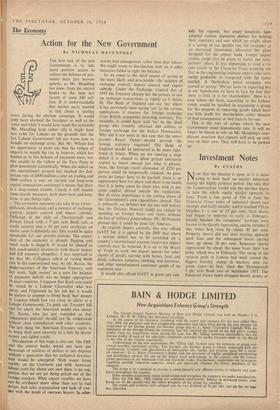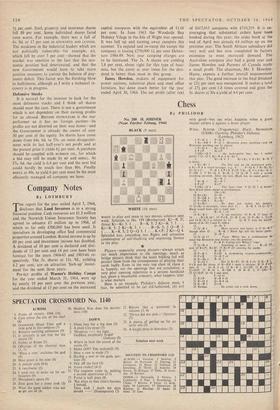. Investment Notes
By CUSTOS
Now that the election is upon us it is inter- esting to look back on market behaviour during this highly political period. The idea that the Conservatives would win the election began to turn the whole equity market upwards in June. From a low point of 334 in June the Financial Times index of industrial shares rose strongly and fairly steadily until it touched 378 an October 1- a rise of 13 per cent. Steel shares had begun to improve as early as February, mainly because the companies' earnings were known to be sharply improving, and by October 1 this index had, risen by about 40 per cent. Property shares .did not start moving upwards until June and the subsequent boom carried them up about 20 fier cent. Insurance shares appreciated by about the same from their low point, which was in February. The swing of the opinion polls to Labour last week caused the biggest five-day slump in markets seen for seven years—in fact, since the Thorneycroft 7 per cent Bank rate of September 1957. The Financial Times index dropped twenty points or 5+ per, cent. Steel, property and insurance shares fell 10 per cent. Some individual shares fared even worse. For example, there was a fall of 6s. 9d. Of 17 per cent in STEWARTS AND LLOYDS. The weakness in the industrial leaders which are not politically vulnerable-for example, to, which fell by over 5 per cent-showed that the market was sensitive to the fact that the eco- nomic position had deteriorated, and that the new Government would have tO take more positive measures to correct the balance of pay- ments deficit. This factor was the finishing blow to bullishness, although as I write a technical re- covery is in progress.
Defensive Stocks
It is natural for the investor to look for the most defensive stocks and I think oil shares should meet the case. There is not a government which is not dependent on their earning profits for us abroad. BRITISH PETROLEUM is the star performer as it has no foreign partner-its profits are not diverted on their way home-and the Government is already the owner of over 50 per cent of the equity. Its shares have come down from 64s. 6d. to 55s. on some disappoint- ment with its last half-year's net profit and at the present price it yields 6+ per cent. A purchase should be • coupled with BuRtviAll OIL, for which a bid may 'still be made by in) and SHELL. At 57s. 6d. the yield is 6.4 per cent and the next bid could hardly be much less than 80s. Finally. SHELL at 40s. to yield 6 per cent must be the most efficiently managed oil company we have.



































 Previous page
Previous page